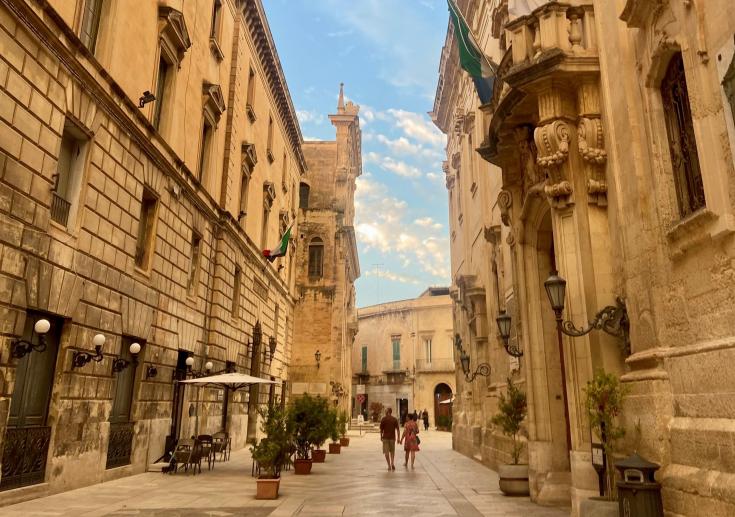Reviving cultural routes

On 25 October, the Policy Learning Platform organised a webinar, as part of the Cultural Routes series, on the topic of reviving cultural routes.
The webinar presented inspirational practices from the Interreg projects MOMAr, RAMSAT and GREEN PILGRIMAGE, as well as a keynote speech from the European Commission. Examples of different cultural routes were shared with participants, to provide inspiration to local and regional policymakers interested in new cultural tourism opportunities.
Webinar recording
You can watch the recording and access the presentations below.
Webinar agenda
Concept and moderation by Astrid Severin and Magda Michaliková, Thematic Experts of Environment and resource efficiency.
00:01:01 Introduction to the topic by Magda Michaliková
00:10:15 Keynote speech by Mariachiara Esposito on Cultural Routes as innovative tourism.
00:26:10 Q&A: How can regions and local authorities get involved?
00:33:17 Q&A: What are the main opportunities for funding?
00:37:57 Q&A: How to react if local authorities and politicians don't have interest to act?
00:40:43 Presentation by Sofia Martins on the Route of the Coffee Smuggling. (RAMSAT)
00:52:37 Q&A: How did you start? How did the group come together to start this idea?
00:54:10 Q&A: Did the municipality finance the idea such as the app?
00:55:18 Q&A: Which kind of events have you been organising so far?
00:56:50 Q&A: How do you involve local people as storytellers? Do you have a strategy?
00:57:57 Presentation by Matouš Radimec on Routes of Reformation. (MOMAr)
01:10:03 Q&A: Why did you want to achieve the certification from the Council of Europe?
01:14:05 Presentation by Luciano Toriello on the Film festival on cultural routes. (Green Pilgrimage)
01:25:46 Q&A: Do you think movie producers are attracted to the location only because of the culture route?
01:27:04 Q&A: How many visitors do you usually attract for the film festival?
Key learnings
- In her keynote speech, Mariachiara Esposito from the European Commission – DG Education, Youth, Sport and Culture talked about the importance of culture as a driver of sustainable development. Culture can play a significant part in raising awareness of issues related to the climate crisis and sustainability, and the voice of scientists, artists and cultural professionals should be included in the respective discussions. Concrete recommendations on how to link culture and sustainability can be found, for example in a report named Stormy Times, Nature and Humans: Cultural Courage For Change, the Sustainable cultural tourism report or the Culture Moves Europe report.
- To preserve their natural and cultural heritage, the Municipality of Marvão has established the Route of the Coffee Smuggling. The Municipality organises guided tours every May, but the route is accessible to tourists all year round. To help visitors explore beautiful nature, old smuggling routes and local gastronomy, a website with information and detailed routes is available.
- The Routes of the Reformation is a cultural route focusing on the history of the Reformation, certified by the Council of Europe. It connects sites, museums, local trails, churches and other places linked to the Reformation. It includes places in Northern Italy, Slovenia, Austria (Trail of the Book), the Czech Republic (the Reformation in the 16th century and the Hussite movement), Poland (evangelical sites), eastern Hungary and parts of Germany (Martin Luther).
- Italy’s Monte Sant’Angelo takes another approach, with an annually held film festival about cultural routes. The festival’s concept is shaped around the idea of slow travel and sustainable tourism. The festival comprises walks, movie screenings, a cinema school etc. The project successfully brings tourism to the region outside the main season and creates a link between culture and nature. Watch the trailer of Monte Sant’Angelo's film festival.
Key takeaways on the revitalisation of cultural routes
- Cultural routes have the potential to connect sites and places that would not otherwise present an attractive point of interest
- New itineraries offer the opportunity to attract new types of visitors to remote locations and can cater for tourism during the low season
- Cultural routes can be co-managed by similarly focused organisations, who benefit from experience exchange and joint marketing
- Resilience and sustainability of the communities involved in the cultural route can be increased
- A bottom-up approach tapping into local knowledge about nature, history, legends, gastronomy and more can ensure the success of a new route
- Certification can bring benefits to your cultural route project in particular to raise credibility and awareness amongst local policy makers
- Involving artists and creative industries in sustainable development projects provides important added value to heritage projects
- Focus on training communities and fostering awareness about climate change through culture
Presentations
Keynote speech by Mariachiara Esposito on Cultural Routes as innovative tourism
Presentation by Sofia Martins on the Route of the Coffee Smuggling
Presentation by Matouš Radimec on Routes of Reformation
Presentation by Luciano Toriello on the Film festival on cultural routes
Presentation by Luciano Toriello on the Film festival on cultural routes
